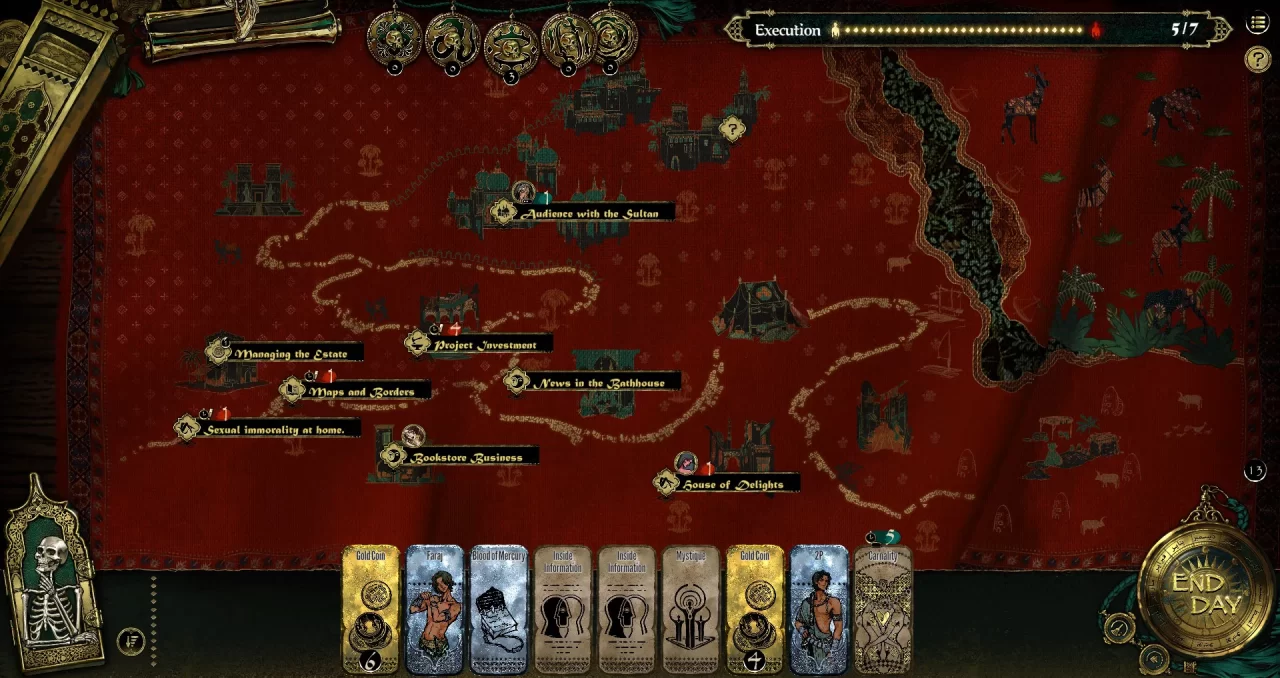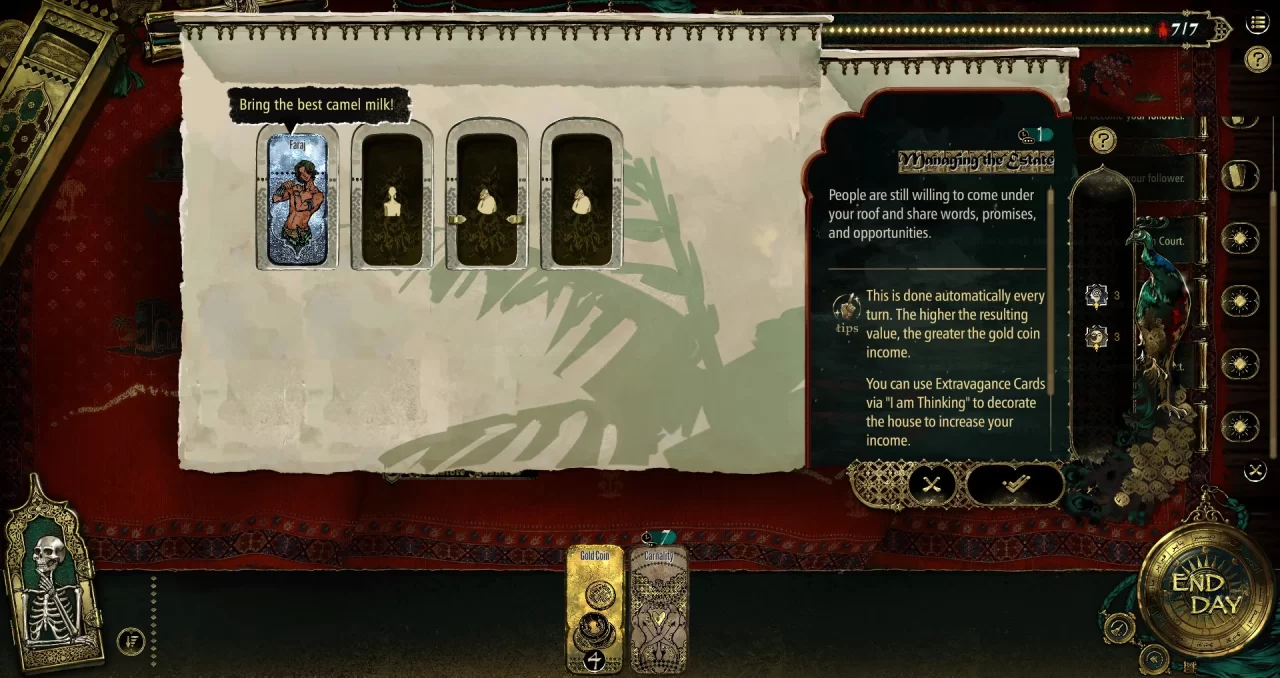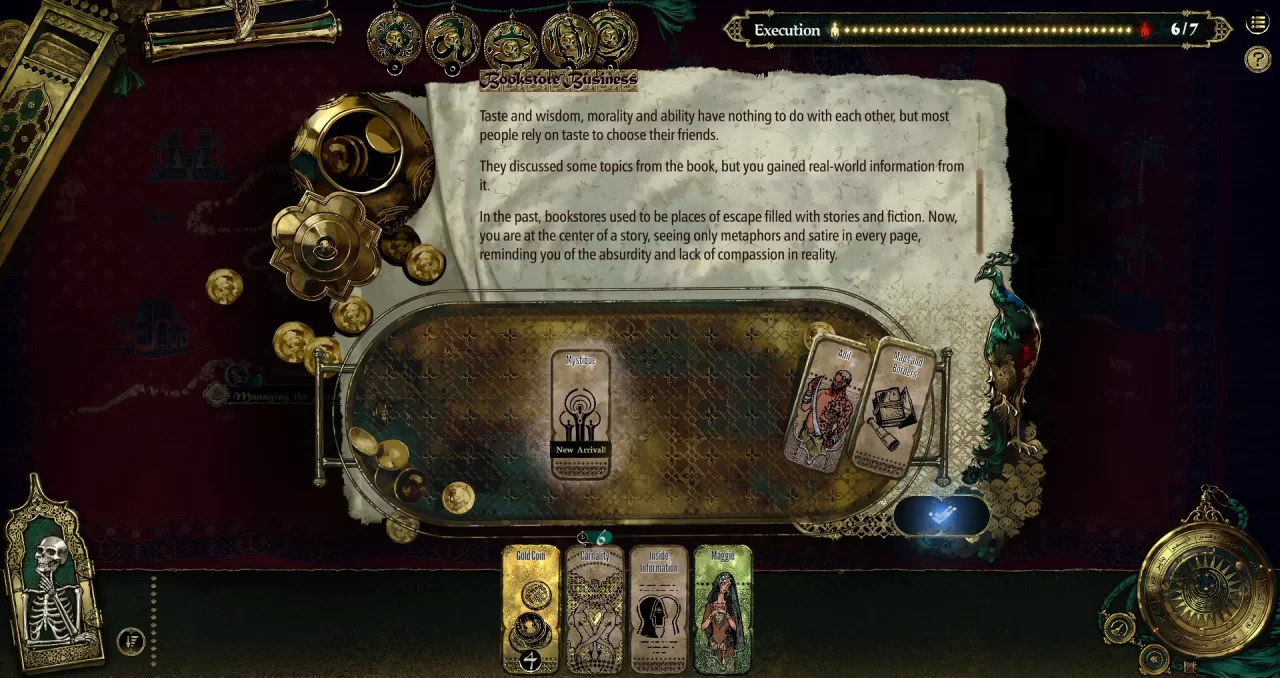Sultan’s Game defies comparison. In 2025, that’s like striking gold. What’s more, the innovation pairs beautifully with a wealth of quality content that’ll give the literarily inclined much to chew on. Mind, this tabletop-meets-roguelike game isn’t a tome of writing, but every event and action tends to include a couple short paragraphs of description. Get ready to set your morals and sensibilities aside, because it’s time to play a ruthless game at the hands of a bored and psychopathic sultan.
The tutorial’s delivered straight, as if implying how the whole game will be played. We witness the origins of the sultan’s game; a leader of an empire who has grown tired of the lavish rule he enjoys, the sultan meets a mysterious magician who offers him a game in which the sinful card the player draws determines what they must do to continue the game—and continue living. Pulled an extravagance card? Prepare to spend that ill-gotten coin. Bloodshed or carnality card? Well, you see where this is going.
After completing the well-constructed tutorial, we meet our hero: us! The protagonist we play is one of many nobles who have been pulled into the sultan’s game, with failure resulting in an untimely demise. In seven days, we must not only satisfy the type of card we pull, but also match the gravity with its tier (stone, bronze, silver, gold). Naturally, carrying on like this comes with consequences, but even traditionally illegal acts—murder, for starters—are allowed for the sake of the sultan’s game. In fact, Sultan’s Game goes to some harrowing places, with players forced to make decisions that may make them uncomfortable. The opening of the game even comes with a warning about this. Rest assured, the writing maintains a modicum of tact and never goes to extremes in terms of description, even if the act itself is reprehensible.
That’s part of the beauty of Sultan’s Game: the writing. It’s tight and impactful, making me buy into this fictitious world and develop an addiction for every new event—at least for the thirty hours or so the main game offers. Even if characters reside on a flat piece of cardstock, I grew attached to them and enjoyed unraveling their stories. Script aside, I attributed a connection with them through gameplay alone. I saw how the character’s attributes—such as a “book lover”—contributed to their development and value as a member of my entourage over time. Certain kinds of events played to specific characters’ strengths, and that alone builds their identity.
So you gotta be asking at this point how this allegedly unique game plays. Sultan’s Game offers a swathe of potential events on a map that players can click on. The resulting pop-up includes a description of what the titled event entails, followed by empty card slots—some necessary, most not. In addition, we see relevant stats for the event that’ll guide our character placement. Most events only factor in one or two stats, and depending on how many fifty-fifty chance successes we roll, we can earn a reward or meet defeat.
Once the character or characters are confirmed for the event, we can click on other nodes and insert additional characters. Sometimes, no character is necessary and we can use accrued items, but most of the time, people lead the charge. Once all characters have been expended, we end the day and see how everything plays out. Various tools in the game allow us to re-roll or add a success, but the bulk of the game lies in character placement, how we outfit them, and, most importantly, resource management.
Initially simple, Sultan’s Game quickly spiders out into a whole web of choices, characters to manage with their own goals and desires, and mysterious treasures we’ve earned through sometimes odd means. For the most part, this isn’t a game in which you go to a bar and try to win a drinking game with four successes. No, the events range from the nefarious to the otherworldly. Prepare to read descriptions thorough enough to whet your curiosity, yet vague enough to instill curiosity; the outcomes sometimes only fan that mystique.
I won’t get into all of the bells and whistles of Sultan’s Game, but rest assured that its options are wonderfully overwhelming as we have to prioritize our life-or-death tasks, with satisfying the sultan’s card always being the chief priority: remember, that card’s mission must be completed in seven days or less. Intuitively, one might figure that building resources for six days and completing the task on the seventh day is the most efficient way to play the game—and you’d be right—but also note that spontaneity and untimely events may trigger on the final day and upend your plans.
Some events are time-sensitive, meaning they will disappear after a day or three, while maladies may crop up that bar our protagonist from acting. Since he is the one playing the sultan’s game, he typically has to be the one completing sultan cards. This can feel unfair and unnecessarily random to some extent, though the game also forecasts that some hardship weighs on the protagonist’s mind, which may inconveniently pre-occupy him at just the right moment. Or an untreated injury may flare up. All this to say that maybe a greedy approach isn’t always the best way.
On the other hand, failure and an early death may be what you need. With two hundred possible endings, death may be just as entertaining as the nihilistic struggle of life. Also, Sultan’s Game boasts an in-game achievement system in which players earn points for meeting certain milestones. These points can be spent for minor or major permanent perks in between games. The cheapest options offer a couple permanent stat buffs on our hero at the start, while the much more expensive choices grant us a whole extra character to play with. Some even do some more oddball things that you can discover for yourself.
Sultan’s Game has been out for a few months at this point, but part of the impetus for this review is the most recent major update that boasts ten new cards—equipment, for the most part. Some even have their own questlines. Although these ten new add-ons certainly expand on the significant volume of content, know that Sultan’s Game is so brimming with imaginative writing and scenarios that this feels like a drop in the bucket. I’ve put in over thirty hours, and I have only recently begun to feel like I’m spinning my wheels a bit. While I’ve technically “beaten the game,” I have a couple specific goals and hard-to-reach feats to meet, because why should I do what this lunatic on the throne wants, anyway?
Although Sultan’s Game is primarily played on a map and box of text, these are pretty maps and boxes of text! The music and visuals are Arabic in nature—even if the world is a fictitious blend of cultures—which is yet another refreshing departure in the gaming landscape. Most titles seem to fall into the Western world or East Asia, so having a taste of the Middle East feels like finding an oasis in a desert. The music also consistently and capably contributes to the atmosphere, with some events having their own unique tracks to accentuate the brief tale told. Similarly, if one isn’t looking closely enough, the illustrations enjoy layered, sometimes strange coloring that are likely best taken in passively. Rather than artwork that is to be stared at and admired—and one could easily do that here—Sultan’s Game’s flair lies in its framing and subtle touches that bring the story to life, even if unconsciously.
Strategic yet led by its narrative and decision-making, Sultan’s Game sinks its venomous fangs in, forcing addled players to say: just one more turn. I had several instances in which I wanted to set up my team’s positions so that I didn’t forget what I wanted to do before I quit for the day, but I was so curious about the outcomes that I clicked to end the day and see the events play out, telling myself that I’d save right after the stories finished. Then the next in-game day rolled around and four new events popped up with their dazzling clinging sounds. I hovered my cursor over just to see the titles. That title! I just had to see what that title meant for the event. Before I knew it, I was placing characters into a whole new set of events. That’s the kind of game this is. Of course, like any venom, a little bit over time builds a tolerance, and while the content in Sultan’s Game may feel endless, there is, indeed, an end. Two-hundred, in fact.






